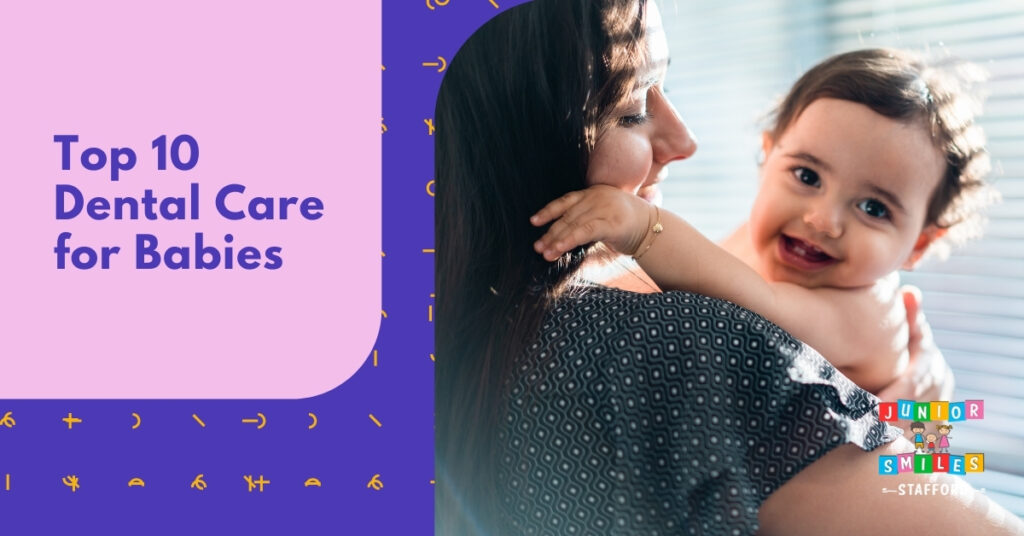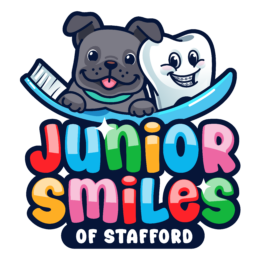6 Oral Care Tips for Infants

No matter your age, maintaining good oral health is crucial. Babies are no different. Teeth typically erupt between the ages of 6 and 10 months for the majority of infants. In other cases, they take around a year to show up. Having only one or two teeth at birth is rather rare. By the time they reach the age of three, the majority of youngsters have fully-erupted baby teeth.
Although baby teeth are tiny, they play a significant role in growing a child’s mouth. If your child’s baby teeth aren’t developing normally, they’ll have problems with chewing, smiling, and communicating. This highlights the need of taking special care of infant teeth and preventing cavities. To help your infant adjust to his or her new schedule, it’s best to start early. This blog post will walk you through the top dental care for babies, what to do during teething, and when you should visit your pediatric dentist.
Gum Cleaning
You should gently cleanse your baby’s lips and gums daily with a clean, soft washcloth until their first tooth comes in. This helps keep the gums from being filled with the sugars found in breast milk or infant formula by preventing their accumulation. Sticky plaque, which bacteria sometimes leave behind, can harm baby teeth when they erupt. Furthermore, this aids in familiarizing kids with the process of getting their mouths cleaned.
Tooth Brushing and Flossing
Use a tiny, gentle toothbrush on your youngster as soon as their teeth begin to erupt. While brushing a row of teeth, tilt the toothbrush head (bristles) so they brush against the gum line. Lightly work the bristles in circular movements. Give each tooth a good brushing. At least once every three to four months, or if the bristles get frayed or worn, you should replace their toothbrush. You can also start flossing between spaces between teeth when a baby’s teeth contact.
Using Toothpaste with Fluoride
The recommended starting point for fluoride toothpaste use in children is the erupting of the first tooth. Apply around the size of a grain of rice to toddlers under the age of 3. Using a pea-sized quantity is appropriate for children aged 3 and above. The natural mineral fluoride strengthens and protects teeth against cavities. Starting to use it at a young age can help shield their teeth from any harm. Nevertheless, it is advised by dentists to introduce fluoride toothpaste to your child whenever they are able to consistently spit out the toothpaste.
Preparing Healthy Diet
Avoid giving children under the age of one sugary beverages, including water, juice, and soda. Only give infant formula or breast milk. You should also refrain from sweetening beverages with honey or other sweeteners. Additionally, as you start introducing solids to your kid, steer clear of meals that are sugary. Snacks like cheese, yogurt, and raw, crunchy fruits and vegetables should gradually increase in frequency as your kid matures. Lessen their intake of sticky starchy soft meals.
Avoiding Baby Bottles in Bed
The protective salivary glands in your baby’s mouth are less active when they sleep. As your infant drifts off to sleep with a bottle in their mouth, the milk might drop down their teeth. The result might be discoloration, pocking, and pitting of the front teeth. Potential issues include tooth decay leading to cavities and, in extreme circumstances, tooth extraction. An additional warning: there is a choking hazard associated with using a bottle to put a baby to sleep.
Going to Regular Check Ups
You should begin bringing your kid to the dentist or oral specialist no later than six months after the first tooth appears, or no later than twelve months of age. You should take your child to the dentist or oral health care provider on a frequent basis. This helps them get used to the regular check ups. By keeping tabs on your child’s dental health, dentists can spot problems before they even start to show symptoms.
Baby Teeth Development
Twenty main, or “baby,” teeth emerge in an infant’s jaws at birth. On average, babies’ first teeth erupt at six months of age. From four to ten months of age, though, it’s possible at any moment. It is common for all teeth to erupt by the time a child is two or three years old. The first steps in taking care of your child’s teeth begin long before they erupt. The adult teeth can’t erupt into proper alignment in the jaw without the baby teeth to stabilize them. So, begin brushing as soon as you see a tooth.
Read More: What to Do When Your Child is Teething
When to Visit Your Pediatrician?
Maintaining good oral health throughout life requires both prevention and education. A kid should see a dentist no later than six months following the emergence of their first tooth, or before their first birthday, according to the American Academy of Pediatric Dentistry. Additionally, if you observe any black spots on your child’s teeth or suspect a dental issue, you should take them to the dentist or oral specialist immediately. And if you see that their top and bottom teeth don’t meet properly when they bite, it’s a sign to bring your child to the dentist.
Why Choose Junior Smiles of Stafford?
When it comes to kid dentistry in Virginia, no one does it better than Junior Smiles of Stafford. Our services are designed to fit your family’s budget and meet your specific needs, all while improving your children’s oral health and giving them a better chance at a lifetime of beautiful smiles. Our mission has always been to give the highest level of customer service and happiness to the people of Stafford as their trusted family dentists. Every member of our team is committed to providing you with exceptional service from the time you enter our office until the conclusion of your appointment.

